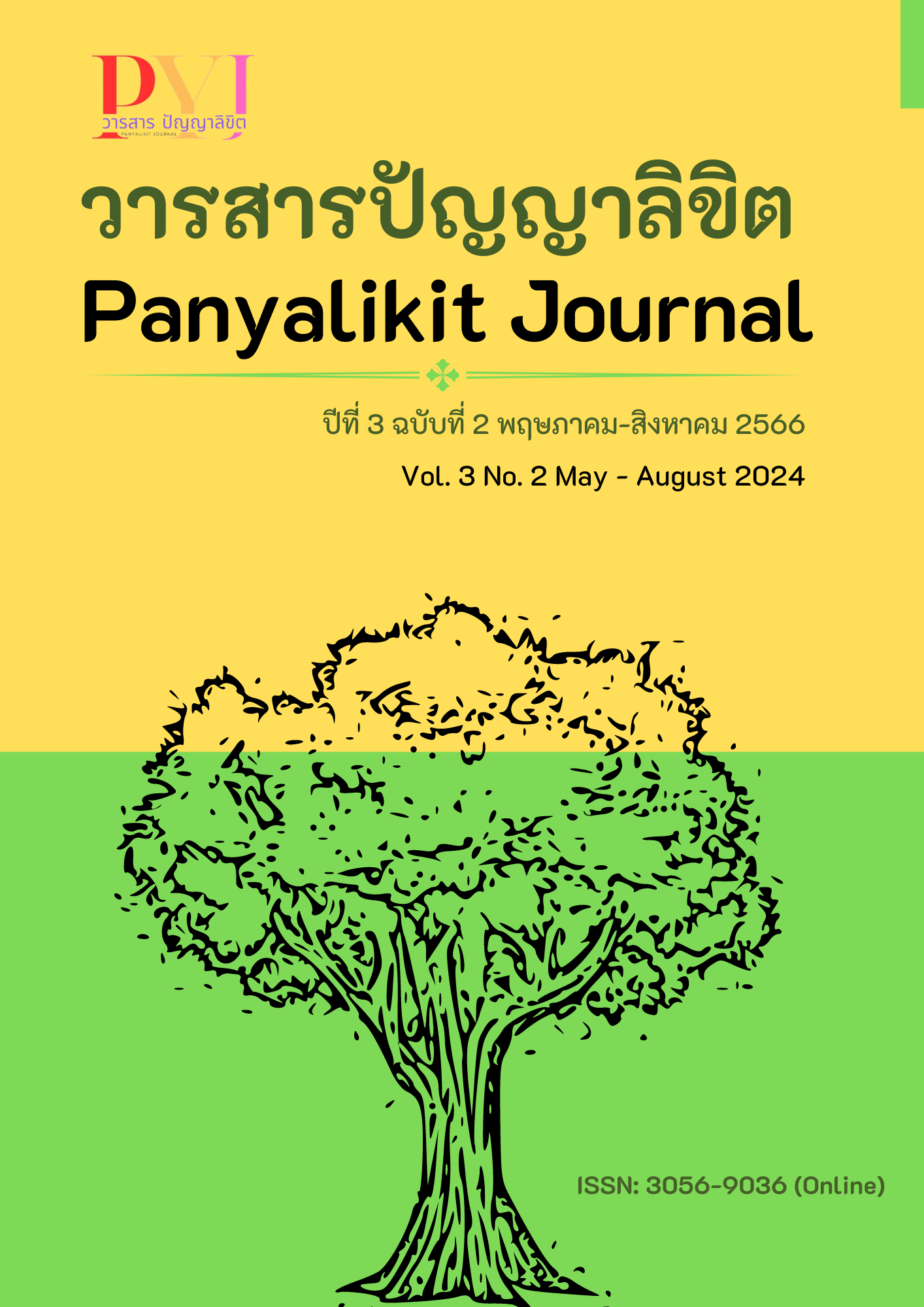การเรียนการสอนวิทยาศาสตร์ในยุคดิจิทัล: นวัตกรรมและแนวทางใหม่ในการศึกษา
Main Article Content
บทคัดย่อ
ในยุคปัจจุบัน การเรียนการสอนวิทยาศาสตร์ได้พัฒนาไปอย่างมากเพื่อตอบสนองความต้องการของโลกที่เปลี่ยนแปลงอย่างรวดเร็ว การเรียนการสอนวิทยาศาสตร์สมัยใหม่รวมวิธีการ, เทคโนโลยี, และแนวทางการสอนที่เป็นนวัตกรรมเพื่อเพิ่มการมีส่วนร่วมและความเข้าใจของนักเรียน บทความนี้นำเสนอภาพรวมของความก้าวหน้าในด้านการเรียนการสอนวิทยาศาสตร์สมัยใหม่ ประการแรก การเรียนรู้โดยการสำรวจเป็นหลักการสำคัญในการเรียนการสอนวิทยาศาสตร์ ซึ่งเน้นให้นักเรียนมีบทบาทในการค้นคว้าและแก้ปัญหา วิธีการนี้กระตุ้นให้นักเรียนตั้งคำถามทางวิทยาศาสตร์ ทำการทดลอง และพัฒนาทักษะการคิดเชิงวิพากษ์ การรวมเทคโนโลยี เช่น การจำลองดิจิทัลและความเป็นจริงเสมือน ช่วยสนับสนุนวิธีการนี้โดยการมอบประสบการณ์ที่ immersive และเครื่องมือที่มีปฏิสัมพันธ์ซึ่งจำลองปรากฏการณ์ทางวิทยาศาสตร์จริง ประการที่สอง การสอนที่เน้นความแตกต่างและการเรียนรู้ที่เป็นการเฉพาะบุคคลได้รับการนำมาใช้เพิ่มขึ้นเพื่อรองรับความต้องการและสไตล์การเรียนรู้ที่หลากหลายของนักเรียน โดยการปรับการสอนให้สอดคล้องกับจุดแข็งและจุดอ่อนของแต่ละบุคคล นักการศึกษาสามารถให้การสนับสนุนที่มีประสิทธิภาพมากขึ้นและปรับปรุงผลลัพธ์การเรียนรู้ นอกจากนี้ การเรียนการสอนวิทยาศาสตร์สมัยใหม่ยังเน้นการใช้เครื่องมือวิเคราะห์ข้อมูลและทรัพยากรดิจิทัลเพื่อส่งเสริมความเข้าใจในแนวคิดทางวิทยาศาสตร์อย่างลึกซึ้ง เครื่องมือทางการศึกษาเหล่านี้ช่วยให้นักเรียนสามารถรวบรวม วิเคราะห์ และตีความข้อมูลได้อย่างมีประสิทธิภาพ ซึ่งช่วยพัฒนาทักษะที่สำคัญสำหรับการสำรวจและการวิจัยทางวิทยาศาสตร์ และยังมีการให้ความสำคัญกับการเชื่อมโยงการเรียนการสอนวิทยาศาสตร์กับการใช้งานจริงและเส้นทางอาชีพ โดยการนำเสนอกรณีศึกษา การนำไปใช้จริง และการปฏิบัติวิชาชีพในหลักสูตร นักการศึกษาได้ช่วยให้นักเรียนเห็นความสำคัญของวิทยาศาสตร์ในชีวิตประจำวันและอาชีพในอนาคต การเรียนการสอนวิทยาศาสตร์สมัยใหม่มีลักษณะเด่นที่เน้นการเรียนรู้โดยการสำรวจ การรวมเทคโนโลยีขั้นสูง การสอนที่เป็นการเฉพาะบุคคล และความเกี่ยวข้องกับโลกแห่งความจริง ความก้าวหน้าเหล่านี้มีเป้าหมายเพื่อเตรียมความพร้อมให้กับนักเรียนสำหรับอนาคตที่ทักษะทางวิทยาศาสตร์และการแก้ปัญหาเป็นสิ่งสำคัญ
Article Details

อนุญาตภายใต้เงื่อนไข Creative Commons Attribution-NonCommercial 4.0 International License.
เอกสารอ้างอิง
Biggs, J., & Tang, C. (2011). Teaching for Quality Learning at University (4th ed.). Maidenhead, UK: Open University Press.
Black, P., & Wiliam, D. (1998). Assessment and classroom learning. Assessment in Education: Principles, Policies and Practice, 5(1), 7-74.
Brinkmann, S. (2022). The ethics of inquiry-based learning. Journal of Educational Research, 115(4), 472-483.
Brown, J. S., Collins, A., & Duguid, P. (1989). Situated cognition and the culture of learning. Educational Researcher, 18(1), 32-42.
Buxton, C. A., & Lee, O. (2014). Inquiry-based science instruction and English language learners: Are they compatible?. Journal of Research in Science Teaching, 51(5), 635–658.
Dooly, M. (2021). Collaboration and intercultural communication: A framework for understanding intercultural exchange. New York: Routledge.
Edelson, D. C. (2001). Designing effective professional development for teachers of science and mathematics. Journal of Science Teacher Education, 12(3), 229-245.
Ennis, R. H. (2011). Critical thinking: A streamlined conception. In J. A. Greenwood (Ed.), The Philosophy of Critical Thinking (pp. 41-54). Cambridge Scholars Publishing.
Garrison, D. R. (2001). E-learning in the 21st century: A framework for research and practice. New York: Routledge.
Garrison, D. R., Anderson, T., & Archer, W. (2010). The first decade of the Community of Inquiry framework: A retrospective. The Internet and Higher Education, 13(1-2), 5-9.
Gay, G. (2018). Culturally Responsive Teaching: Theory, Research, and Practice (3rd ed.). Teachers College Press.
Hargie, O. (2016). The handbook of communication skills. New York: Routledge.
Hattie, J., & Yates, G. C. R. (2014). Visible Learning and the Science of How We Learn. New York: Routledge.
Herrington, J., & Oliver, R. (2000). An instructional design framework for authentic learning environments. Educational Technology Research and Development, 48(3), 23-48.
Hofstein, A., & Lunetta, V. N. (2004). The laboratory in science education: Foundations for the twenty-first century. Science Education, 88(1), 28-54.
Johnson, D. W., & Johnson, R. T. (2019). Cooperation and the use of technology in education. New York: Routledge.
Kuhn, D. (2019). The skills of argument. Cambridge University Press.
Laal, M., & Ghodsi, S. M. (2012). The effectiveness of collaborative learning. Procedia - Social and Behavioral Sciences, 31, 493-497.
Llewellyn, D. (2018). Teaching high school science through inquiry and argumentation. New York: SAGE Publications.
National Research Council. (2012). A framework for K-12 science education: Practices, crosscutting concepts, and core ideas. Washington DC: The National Academies Press.
Niyomkarn, T. (2021). The Use of Virtual Reality Technology in Science Teaching. Journal of Science Education and Research, 12(3), 102-119.
Niyomkarn, T., & Chalerm, T. (2021). Cooperative Learning in Science Classrooms. Journal of Educational Research and Development, 11(2), 95-112.
Phondej, S. (2018). Using Simulation Software to Enhance Learning in Science Classrooms. Journal of Educational Technology, 17(2), 88-97.
Phondej, S., Chaturong, W. & Srisawasdi, N. (2018). Inquiry-Based Learning in the Thai Science Classroom: An Analysis of Its Impact and Implications. Asia-Pacific Journal of Science Education, 4(1), 22-35.
Piboonrungroj, K. (2019). Differentiated Instruction in Science Classrooms. Journal of Science Education Research, 15(3), 45-59.
Piboonrungroj, K. (2019). Improving Teaching Methods through Online Learning Platforms in Science Education. Journal of Science Education, 15(4), 54-68.
Slavin, R. E. (2015). Cooperative learning in elementary schools. Education 3-13, 43, 5-14.
Srisawasdi, N. (2020). The Use of Digital Learning Media in Science Education: Challenges and Opportunities. Journal of Educational Technology Science, 18(1), 33-47.
Srisawasdi, N., Kerdpol, S., & Seophand, S. (2020). The Use of Information Technology in Developing Science Teaching in Thailand. Journal of Educational Development, 20(1), 67-89.
Vygotsky, L. S. (1978). Mind in society: The development of higher psychological processes. Cambridge: Harvard University Press.
Wongsothorn, A. (2017). Analyzing Scientific Data with Digital Tools: A Case Study in Physics Classrooms. Journal of Science Study, 13(2), 120-135.
Wongsothorn, A., Rattanavich, S., & Chaisri, S. (2017). Applying Learning Theories in Science Classrooms. Journal of Educational Science, 14(2), 75-91.


